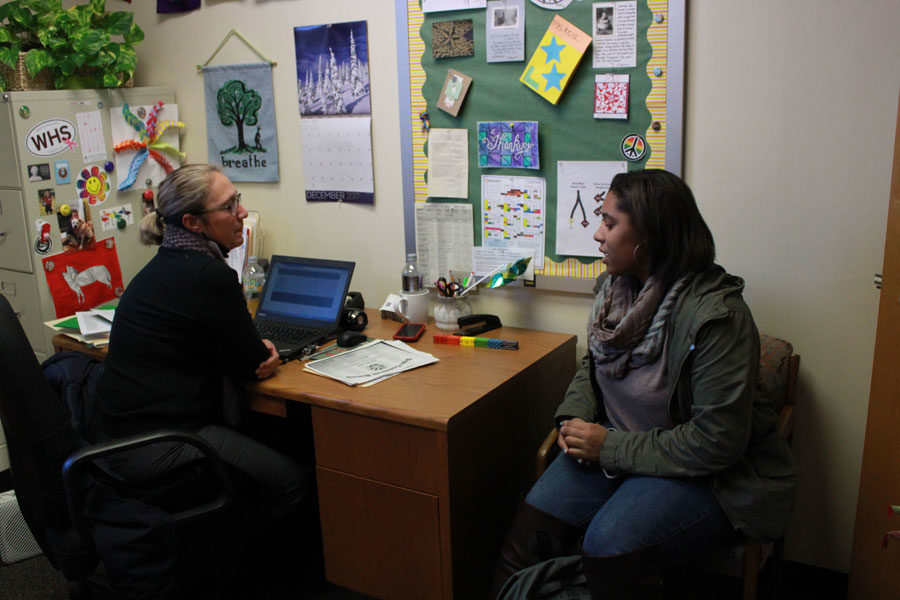How to prepare for the college application process
Mrs. Reid works with many students on their journey to college.
Along with the joys and perks of senior year, many seniors are faced with the daunting question of what they want to do for the rest of their lives. For many of them, college is the next step in their journey. Beyond choosing which college to go to and what to major in, the college application process itself can be a scary process. Primarily, it is a way for them to present themselves the best way they can through essays, transcripts, and test scores.
One of the first tasks seniors find themselves completing is asking teachers and counselors to write letters of recommendations on their behalf.
“Some of the students that I find it easier to write a letter for are students that I’ve had conversations with and it’s clear to me that the interest is outside of the class,” Melissa Schug, AP Environmental Science teacher.
One of the most important aspects of the college application is teacher and counselor recommendations. These inform colleges how students are on a day to day basis or throughout their academic careers, but getting this essential part of the application is difficult for students, teachers, and counselors alike.
“I have a lot of kids on my caseload. I’m at five hundred,” senior class Counselor Jasmine Alston said. “It’s hard because I want to give all of my students the attention and what they need. But we do a really good job here.”
Starting senior year can be a nerve-wracking process, but trying to communicate with counselors and deciding the next steps in life can be even more stressful. Many students realize that their deadlines come very soon after school starts.
“I feel like we’re already in the middle of the [application] process our senior year,” senior Catherine Bynum said. “Applications are really stressful.”
Thankfully, counselors and career services are meant to help students through this process. Counselors guide students to make the best decisions they can about their future. Sarah Joyner, Career and Technical Education Co-department Chair, helps walk them through how to find out what they want to do if they are unsure.
“There are lots of tools, and lots of things I show students like CFNC personality and interest inventory,” Joyner said. “
. That might not even be what they’re interested in.”After deciding what they want to do, students can talk to counselors about the best colleges for their major. Sometimes the best college for someone may not be the biggest or most popular college. It’s best to consider all of the options before they actually hit “submit” on an application. A student may want to do this towards the end of junior year rather than the beginning of senior year and make a habit of visiting the counselors.
“Utilize your counselors because they can help you with the college application process. Go to your counselor at least once so they can review your application,” Bynum said.
Senior year is often thought of as a time to relax or simply prepare for the next stage of life. During the summer before the start of senior year, seniors can build their profile for college applications, which can save them a lot of time during senior year. Time management is the best way to ensure the application process goes smoothly. Your deadlines are dependent upon which colleges are applied to and how high that college is on the list, so be sure to pay attention to them to make sure you don’t miss them.
“I’ve had a guest speaker who actually suggests that students make a spreadsheet,” Joyner said. “Not everyone is going to be that super-organized of a person, but it’s a good idea because the spreadsheet has the school name, application deadline, additional recommendation, and how much it costs.”
The majority of the college application is dependent upon student input, but counselors contribute a large part as well. Counselors send information about grades, school profile, and even give personal recommendations. Without this information, colleges can’t accurately evaluate how well a student will fit in at that school. It’s best to keep in mind that your counselors, teachers, and members of student services are here to help and guide you.
“It’s finding what your interest are,” Joyner said. “It’s finding your superhero power, what your passions are, and matching that with something as well. ”





